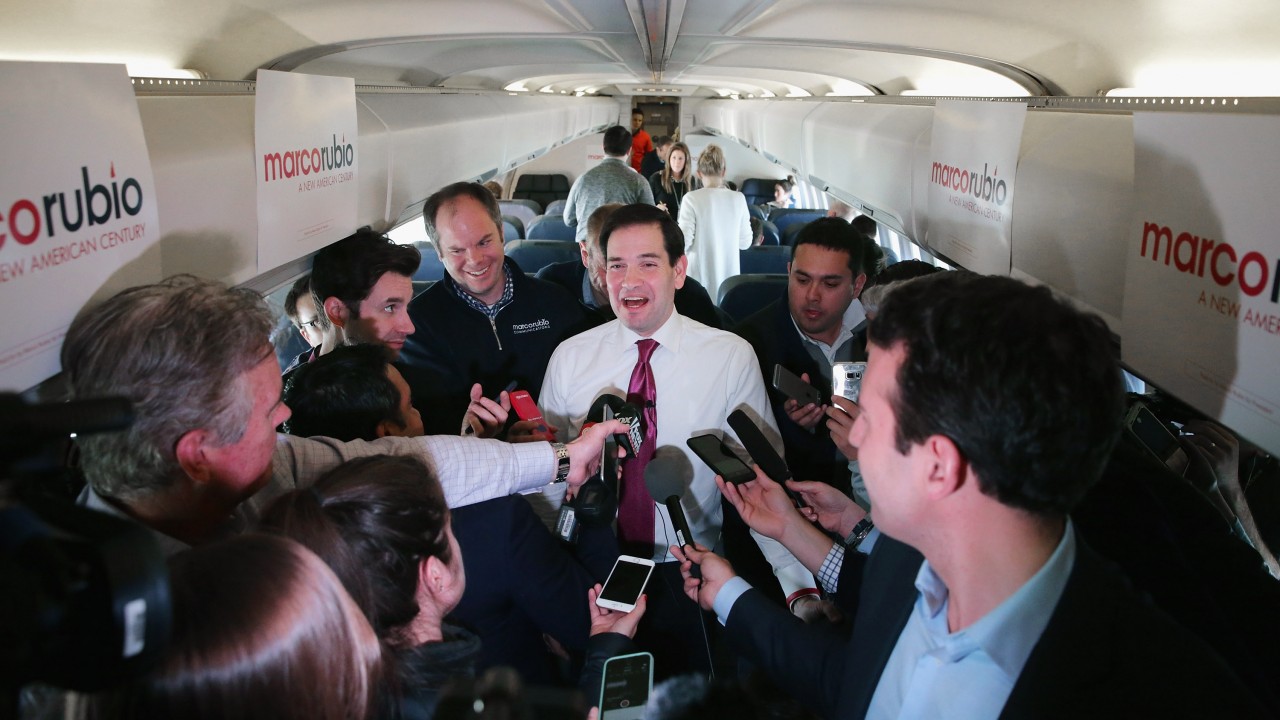
Republican presidential candidate Sen. Marco Rubio (R-FL) talks with reporters on his charter flight from Manchester-Boston Regional Airport February 10, 2016 en route to Spartanburg, South Carolina. (Photo by Chip Somodevilla/Getty Images)
You would have to be living in a cave not to know that a huge dissatisfaction is sweeping the country. It is said to account for Donald Trump’s and Bernie Sanders’ surprising appeal, and it is generally attributed to the dysfunction of our politics. But you can’t blame politicians alone. Political journalists also play an enormous role in creating a sense of malaise, distrust and division, and it stems not only from what they do but also from what they don’t do.
First, what they do. Oh, I know what you’re probably thinking: They go on the hustings with the candidates, they attend the rallies, they talk to voters and take the country’s temperature, occasionally they even talk to the candidates themselves, they issue verdicts on the state of the race, and they tell us what is going on. This past Monday, for example, all three network news broadcasts reported the big doings in South Carolina as George W. Bush arrived to campaign for brother Jeb, and then told us about Donald Trump’s attacks on W., Jeb and Ted Cruz, who Trump accused of being “the biggest liar.” The stories, by Pete Alexander (NBC), Major Garrett (CBS) and Tom Llamas (ABC), were virtually identical, even down to the sound bites.
But here’s the thing: Alexander, Garrett and Llamas are not alone. There are dozens of other reporters, from cable TV, newspapers, magazines, radio, even digital media, all in South Carolina covering the same story in exactly the same way with the same soundbites. Bush-Trump-Cruz. I am not saying that it isn’t a story. I am simply saying that we don’t need dozens of reporters telling it.
The most revealing nugget of political media analysis I ever saw was a scene in a documentary on the 2000 election by Alexandra Pelosi, Nancy’s daughter, in which the reporters are all crouched over their computers at the end of a long campaign day, and one shouts to his confreres: “What’s the story today?” Perhaps there was a time when an intrepid reporter made his reputation by writing the story that nobody else was writing, but today there is almost always a story du jour. On Monday, it was Bush-Trump-Cruz.
Of course, that is not all reporters do. They generally contextualize their reports in a larger narrative framework that turns every campaign into an action movie with all sorts of twists and turns and ups and downs. Just about everybody complains about this sort of coverage – it’s called “horse race” coverage because it focuses on the excitement of the campaign itself to the exclusion of the issues, which are thought to be boring. Every election cycle the press promises that it will reform, and give us a more substantive political journalism. It never does. It probably never will.
This has been going on for so long now that you may think it harmless. I think otherwise. That horse race coverage goes a long way toward diminishing our politics, not only because it focuses on the candidates’ basest qualities (Harvard professor Thomas Patterson observed that the media have a bias for negativity), and on the least important aspect of a campaign — who’s winning rather than how the winner will govern – but also because it makes the entire process seem unserious and even, at times, ugly.
Campaigns nowadays are conducted in a miasma of contempt, and a lot of that not only is directed at the media, it can be laid at the feet of the media because they create that kind of hostile environment. Candidates have contempt for the media, the media have contempt for the candidates, and the public has contempt for everyone, politicians and press, and, most significantly for politics. That isn’t healthy for a democracy.
And that’s where what political reporters fail to do comes in. We hear a lot, especially from the right, about the press’ political bias, but we don’t hear much about its ineptitude: its fear of partisan attack and of being left out on a limb, its lack of knowledge about anything but the election process, and its laziness – too lazy to get off the campaign trail and do what real journalists do, which is to subject policy pronouncements to deep analysis. A Pew State of the News Media survey found that while 54 percent of the public thought journalists were more important today than ever before, 65 percent also believed that they focused on unimportant stories. In short, reporters are important, but not very good at their jobs.
This isn’t to say that we don’t get occasional stories that educate us. The New York Times’ Jackie Calmes had one on Tuesday in which she interviewed left-leaning economists on the cost of Bernie Sanders’ proposals. And The Washington Post had one on Wednesday in which David Fahrenthold and Katie Zezima examined how Ted Cruz tried to defund Obamacare, giving us an insight into his willingness to harm the country just to advance his candidacy.
Every candidate and his policies should be subjected to that kind of scrutiny, and, god knows, the media have the manpower to do it. They just don’t seem to have the will.
And so we remain uninformed and cynical – a dangerous combination.




